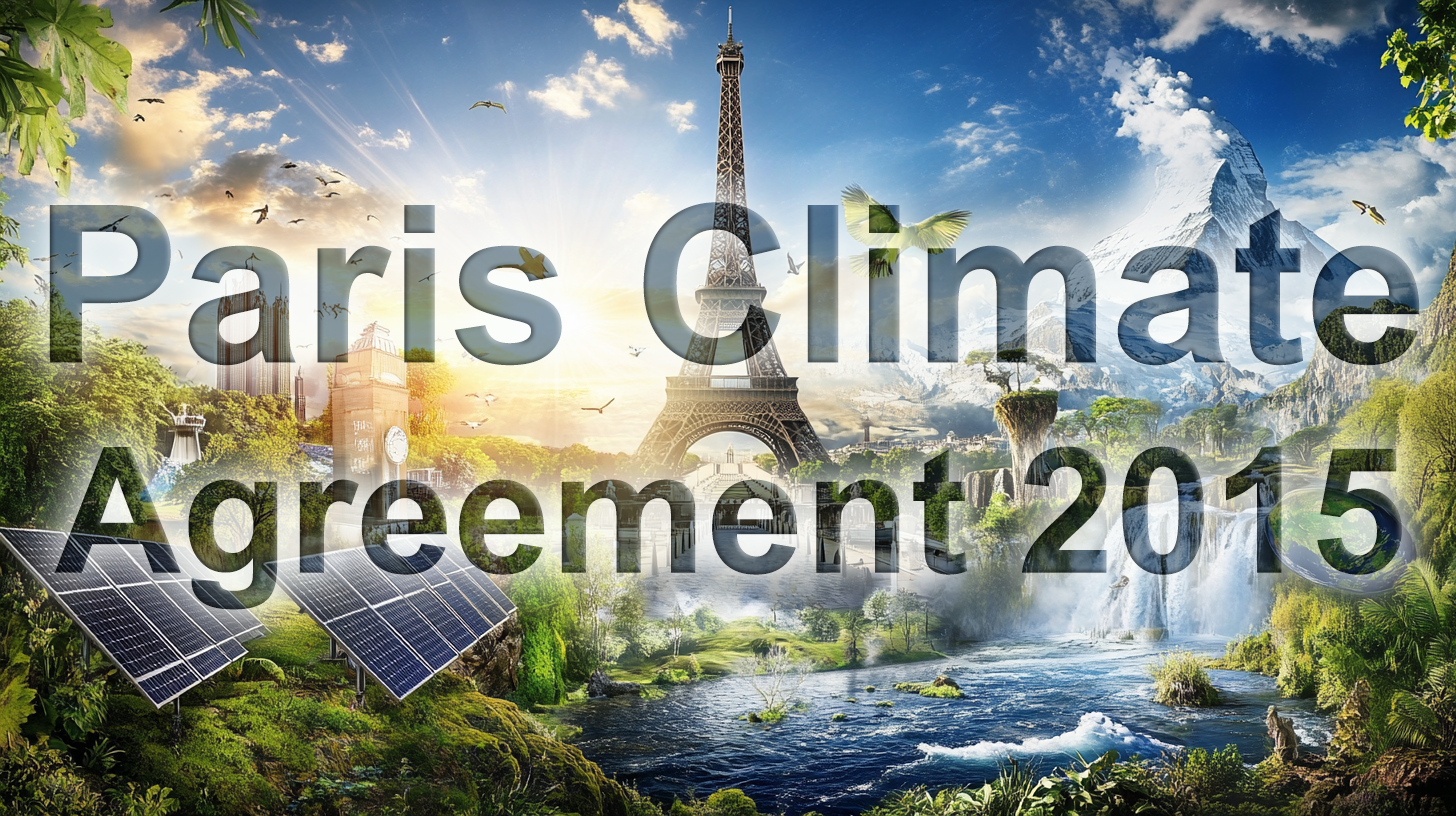🌎⚡ Global Climate Strategy: How the Paris Agreement is set to transform the economy
🌍🌿 The "Paris Agreement," adopted at the World Climate Conference in Paris on December 12, 2015, represents a significant milestone in the global fight against climate change. It is in line with the recently adopted 2030 Agenda for Sustainable Development and commits a total of 195 countries to actively mitigate climate change and to gradually transform the international economy into a climate-friendly one.
The Paris Climate Agreement has been ratified by 194 states and the European Union, representing a total of 195 parties. This includes almost all members of the United Nations as well as the EU as a separate party. Three countries (Iran, Libya, and Yemen) have signed the agreement but have not yet ratified it.
Three key objectives of the agreement are set out in Article 2:
- Global warming should be significantly limited and ideally reduced to 1.5 degrees Celsius compared to pre-industrial levels, but in any case remain below two degrees Celsius.
- Greenhouse gas emissions should be reduced and society adapted to the consequences of climate change.
- Financial flows should be consistently directed in line with the agreed climate protection goals.
The aim is to initiate a transformation towards a sustainable, resource-efficient global economy in order to curb the progression of climate change as much as possible and to secure the livelihoods of future generations.
The Climate Change Performance Index (CCI) is an important tool for making international climate policy more transparent and comprehensible. Developed by the German environmental and development organization Germanwatch e.V., the CCI serves as a benchmark for assessing the climate protection performance of countries worldwide. It examines 63 countries and the European Union, which together are responsible for over 90 percent of global greenhouse gas emissions. Since its first publication in 2005, the index has been updated annually and presented at the UN Climate Change Conferences.
The Climate Change Index (CCI) is developed in cooperation with the NewClimate Institute and the Climate Action Network International, with financial support from the Barthel Foundation. Through standardized criteria, the index offers a comparable assessment, making it possible to highlight progress and shortcomings in climate protection.
Suitable for:
🌐📊 The structure of the Climate Protection Index
The KSI is based on four main categories, each weighted differently:
1. Greenhouse gas emissions (40%)
This assesses how effectively a country has reduced its emissions and whether it is on a path that is compatible with the goals of the Paris Climate Agreement.
2. Renewable energies (20%)
This category examines the share of renewable energies in a country's energy mix and its progress in expanding sustainable energy sources.
3. Energy consumption (20%)
The focus here is on energy efficiency and absolute energy consumption per capita.
4. Climate policy (20%)
This category analyzes the measures governments are taking at the national and international level to combat climate change.
The results from these categories are combined to create an overall assessment that ranks countries. The top three places are deliberately not awarded to emphasize that no country is currently acting with sufficient ambition to fully address the climate crisis.
🏆💡 The top performers in KSI 2024
In the current Climate Change Performance Index 2024, Scandinavian countries such as Denmark and Sweden demonstrate particularly strong performance in the fight against climate change. These countries are characterized by ambitious national climate targets, a high share of renewable energies, and the consistent implementation of climate policies. Morocco has also been among the leaders in the KSI for years – a remarkable example of how countries of the Global South can also assume a leading role through targeted investments in solar and wind energy.
Germany ranks in the middle of the pack. While the country has made progress in the energy transition and is focusing on expanding renewable energies, challenges such as high emissions in the transport sector and delays in phasing out coal remain.
🚨❌ Countries with catching up to do
Large emitters such as China, Russia, and Saudi Arabia, as well as some emerging economies, often occupy the bottom of the rankings. These countries have either failed to take sufficient measures to reduce their emissions or continue to rely heavily on fossil fuels like coal and oil. A particularly critical assessment is made when national climate targets do not align with the Paris Agreement or when a clear decarbonization strategy is lacking.
💡📣 Why is the KSI important?
The climate protection index fulfills several key functions:
Awareness raising
By highlighting progress and shortcomings, he raises awareness among politicians and the public about the urgency of ambitious climate protection measures.
comparability
Through uniform criteria, the KSI enables an objective comparison between countries and shows which measures are particularly effective.
incentive
Countries can strengthen their international reputation through good rankings in the index and at the same time put pressure on other countries to increase their efforts.
One example of the impact of the KSI is the increasing willingness of many countries to raise their climate targets – often in response to poor ratings in the index.
🌱⚡ Challenges in implementing climate protection measures
Despite positive developments, there are numerous obstacles to implementing effective climate policy:
1. Economic interests
In many countries, economic priorities such as preserving jobs in fossil fuel industries or economic growth conflict with climate policy goals.
2. Political instability
Particularly in developing countries, political uncertainties or a lack of institutional capacity hinder the implementation of long-term measures.
3. International Cooperation
The global nature of climate change requires close cooperation between states – a goal that is often made more difficult by geopolitical tensions.
4. Financing
The costs of transitioning to a climate-neutral economy are high, especially for poorer countries, which often rely on support from industrialized nations.
🚀🌎 Perspectives for the future
To advance the global fight against the climate crisis, all actors – from governments to businesses to civil society – must intensify their efforts:
More ambitious goals
It is crucial that countries align their nationally determined contributions (NDCs) more closely with scientific findings and set more ambitious reduction targets.
Technological innovations
The expansion of technologies for CO₂ capture and storage, as well as progress in renewable energies, can be crucial levers.
Strengthening international agreements
Initiatives such as the Paris Agreement need to be further developed to create more binding commitments and mechanisms to monitor compliance.
Promoting global justice
Particularly vulnerable countries need financial support and access to technologies to adapt to the consequences of climate change while promoting sustainable development.
The Climate Change Performance Index (CCI) vividly illustrates where progress is being made and where there is still a need to catch up – both in industrialized countries and in the Global South. While some countries are already acting as role models and taking ambitious measures, much remains to be done worldwide to achieve the goal of a climate-neutral world by mid-century. The CCI reminds us that transparency and comparability are essential for building political pressure and bringing about real change – because only through collective action can the global climate crisis be overcome.
Which countries have not ratified the climate agreement?
Three countries have not yet ratified the 2015 Paris Climate Agreement: Iran, Libya and Yemen.
Iran is the largest emitter among these countries, accounting for approximately 2% of global greenhouse gas emissions. Its refusal to ratify the agreement is primarily attributed to international sanctions against the country, which hinder investment in renewable energy and other climate protection measures. Iran has indicated it would ratify the agreement if the sanctions are lifted.
Libya (0.16% of global emissions) and Yemen (0.03%) have also not ratified the agreement. Both countries are plagued by political instability and conflict, which complicates the implementation of international agreements.
These three countries together contribute about 2.19% to global emissions, while 194 states and the European Union have already ratified the agreement.
📣 Similar topics
🌍 The significance of the Paris Climate Agreement in global climate protection
📊 Climate Change Performance Index: A benchmark for transparency in climate policy
💡 Technological innovations as the key to climate neutrality
💶 Guiding financial flows: Why investments are crucial
🔥 Stopping global warming: Goals and challenges of the 1.5-degree limit
🛑 Countries lagging behind in the 2024 Climate Change Performance Index
⚡ Renewable energies and their contribution to the transformation of the global economy
🌱 Morocco and Denmark: Role models in international climate protection
🔍 The role of the CSI in assessing global climate policy
✍️ Why Iran, Libya, and Yemen have not ratified the Paris Agreement
#️⃣ Hashtags: #ClimateProtectionIndex #ParisClimateAgreement #RenewableEnergies #ClimateTargets #TransparencyInClimateProtection
Our recommendation: 🌍 Limitless reach 🔗 Networked 🌐 Multilingual 💪 Strong sales: 💡 Authentic with strategy 🚀 Innovation meets 🧠 Intuition
At a time when a company's digital presence determines its success, the challenge is how to make this presence authentic, individual and far-reaching. Xpert.Digital offers an innovative solution that positions itself as an intersection between an industry hub, a blog and a brand ambassador. It combines the advantages of communication and sales channels in a single platform and enables publication in 18 different languages. The cooperation with partner portals and the possibility of publishing articles on Google News and a press distribution list with around 8,000 journalists and readers maximize the reach and visibility of the content. This represents an essential factor in external sales & marketing (SMarketing).
More about it here:
We are there for you - advice - planning - implementation - project management
☑️ SME support in strategy, consulting, planning and implementation
☑️ Creation or realignment of the digital strategy and digitalization
☑️ Expansion and optimization of international sales processes
☑️ Global & Digital B2B trading platforms
☑️ Pioneer Business Development
I would be happy to serve as your personal advisor.
You can contact me by filling out the contact form below or simply call me on +49 89 89 674 804 (Munich) .
I'm looking forward to our joint project.
Xpert.Digital - Konrad Wolfenstein
Xpert.Digital is a hub for industry with a focus on digitalization, mechanical engineering, logistics/intralogistics and photovoltaics.
With our 360° business development solution, we support well-known companies from new business to after sales.
Market intelligence, smarketing, marketing automation, content development, PR, mail campaigns, personalized social media and lead nurturing are part of our digital tools.
You can find out more at: www.xpert.digital - www.xpert.solar - www.xpert.plus


